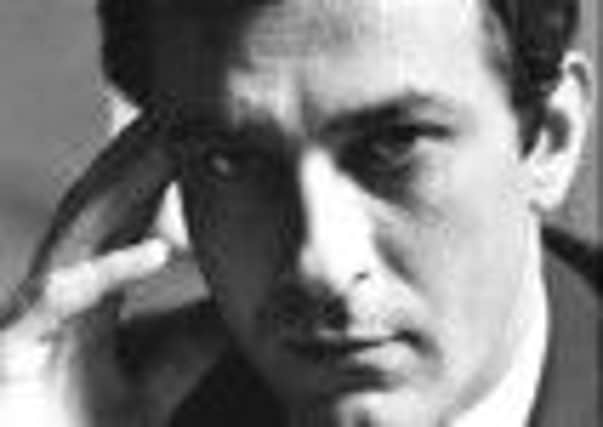Obituary: Richard Kershaw, broadcaster and former Scotsman diplomatic correspondent


RICHARD Kershaw was a reporter on many current affairs’ programmes on the BBC, most notably Panorama. He had a broad and detailed knowledge of African affairs that made his reports hugely influential. Kershaw’s grasp of social and political affairs brought him a wider audience when he and Frank Bough worked on Nationwide. Indeed, he became something of a cult figure. His relaxed manner, melodious voice and handsome appearance made him ideal for an early evening audience.
From 1960-63 Kershaw was the Commonwealth correspondent, then the diplomatic correspondent, of The Scotsman. It was a post that gave him the opportunity to advance his keen interest in international affairs. He principally operated from the London office, working with Neal Ascherson and Colin Bell.
Advertisement
Hide AdAdvertisement
Hide AdKershaw had a long established connection with Scotland, dating from his youth when he became close family friends with Harry and Ray Calder, spending summer holidays working on their Billiemains Farm near Berwick-upon-Tweed. “Richard loved the Borders and spent many happy hours as a lad on the farm at harvest time and tending the horses,” Ray recalls with obvious affection. “He loved the countryside.
“Richard used to return with his wife, the dance critic Jann Parry, and stay here during the Festival. The arguments round the kitchen table went on late into the night: Richard loved a discussion and a good argument. He had insight and was a born intellect. Richard and Jan often holidayed at Achiltibuie, which they both loved.”
Richard Ruegg Kershaw was the son of an Australian banker who had won an MC in the First World War. Kershaw attended Cheltenham College, where he was a keen sportsman and did National Service in Germany in the Royal Artillery. He won an exhibition to read history at Clare College, Cambridge, and in 1957 joined the Commonwealth Relations Office – the knowledge he gained on Commonwealth affair, especially African, was to be of immense significance throughout his career.
An added responsibility was to act as the overnight resident clerk at the Foreign Office, but then Kershaw joined the Financial Times working with the future chancellor Nigel Lawson before joining The Scotsman. In 1963, Kershaw was awarded the British Eisenhower Fellowship and spent a year in Washington familiarising himself with the workings of government in the American capital.
On his return to Britain, Kershaw was appointed editor of the influential periodical Africa Confidential. On his own initiative, Kershaw widened the magazine’s coverage and expanded its readership.
His first television work was on ITV’s This Week, covering the Congo in 1960 after its independence and the political turmoil that ensued.
Films followed on the unrest in the Sudan and Ethiopia and on the political confusion surrounding the unilateral declaration of independence by Ian Smith in Rhodesia (now known as Zimbabwe).
Kershaw joined Panorama in 1967 and his reports covered the entire political, social and cultural affairs of the UK. Subjects ranged from the NHS, through the problems in the Welsh and Scottish pits to cultural matters. Kershaw travelled to Glasgow to interview members of the Scottish National Orchestra and compare their conditions with those at Glyndebourne and the Royal Opera House.
Advertisement
Hide AdAdvertisement
Hide AdHe was regarded as one of a generation of “star” reporters at Panorama who interviewed with calm but definite authority – and a profound knowledge of the subject being discussed. In 1975 he carried out a penetrating interview with Rhodesia’s Ian Smith and often reported on the fundamental changes taking place in the Middle East.
While reporting in Northern Ireland, Kershaw experienced the violence at first hand – he was beaten up by the RUC at a Peace March in Armagh in 1968. He covered elections in the US and in 1966 made a profile of Bobby Kennedy, speculating whether Kennedy would run for the Democratic nomination against Lyndon B Johnston.
In 1968, Kershaw demonstrated his clear understanding of the US political scene when he produced a balanced and detailed report on Ronald Reagan: then forsaking Hollywood to stand as governor of California. In his final piece to camera, Kershaw forecast that Reagan would become a major force both in American politics and the Republican party.
Kershaw played a leading role in domestic UK affairs and was, throughout the Seventies and Eighties, part of the team that supported Sir Robin Day in the coverage of the general elections.
Kershaw loved skiing and cricket – he was an enthusiastic member of the MCC.
His first marriage, in 1962, to Venetia Murray, was dissolved. On his 60th birthday he proposed to his long-time partner Jann Parry, the dance critic of the Observer. Kershaw nursed her through a terrible sickness after she had been crushed on her moped by a London bus. She survives him with a daughter and stepson of his first marriage.